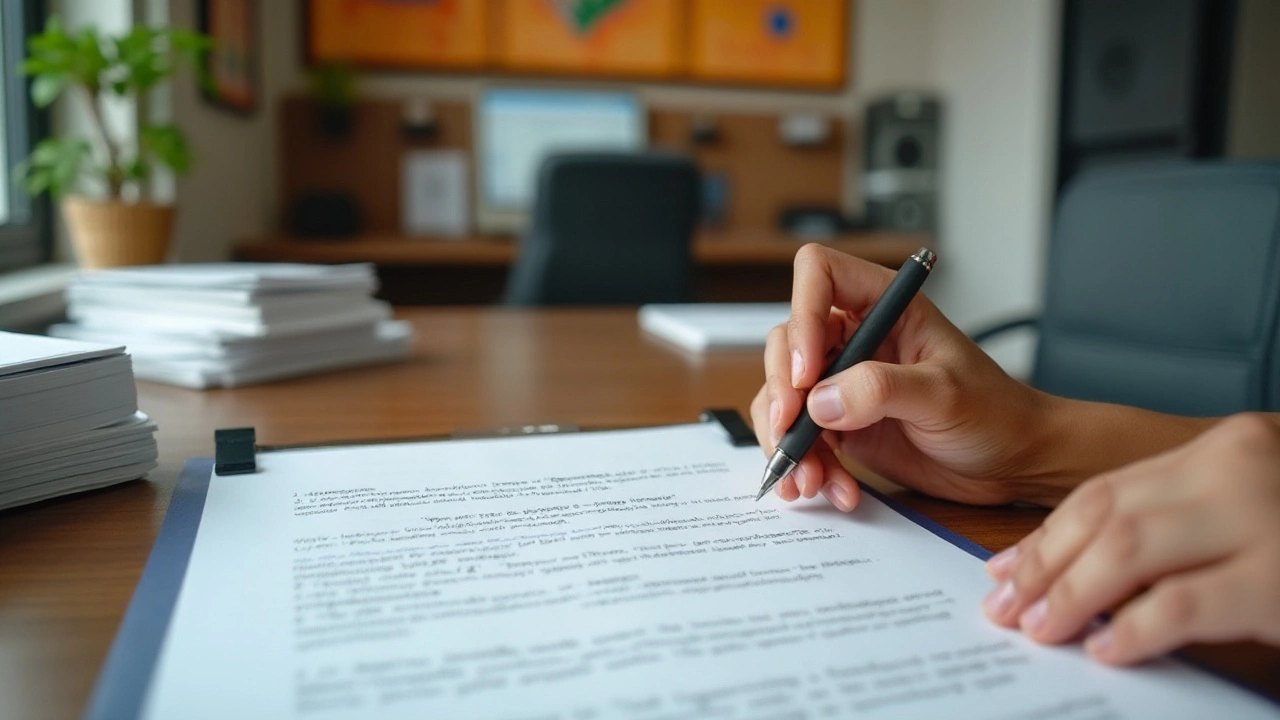Renting a home comes with a host of considerations, and at the center of it all lies a crucial piece of paper: the landlord agreement. This document is more than just a formality. It's a roadmap that defines the journey you and your landlord will embark on during the tenancy period.
A well-drafted landlord agreement can help dodge misunderstandings, making everything from rent payments to maintenance requests run smoother. But what exactly does this contract entail, and why is it so important in the rental process? Whether you're new to renting or a seasoned tenant, understanding the ins and outs of a landlord agreement can be a game-changer.
- Introduction to Landlord Agreements
- Key Components of a Rental Contract
- Importance of Custom Clauses
- Legal Responsibilities of Landlords and Tenants
- Tips for a Smooth Rental Experience
Introduction to Landlord Agreements
When stepping into the world of renting, one of the first legal hurdles you'll encounter is the landlord agreement. Often synonymous with a lease or rental contract, this document is a vital cornerstone for ensuring a harmonious tenant-landlord relationship. At its core, a landlord agreement is a legally binding contract that specifies the terms and conditions of renting a property. It acts like a rulebook, outlining everything from rental amounts to maintenance responsibilities, ensuring both landlord and tenant know precisely what's expected of them. This clarity not only helps in preventing conflicts but also enhances the living experience for both parties involved.
The significance of a well-structured agreement cannot be overstated. It's not just a formality to be completed and forgotten. Rather, the landlord agreement serves as a living document, referenced throughout the tenure. It delineates the rental terms, including the duration of occupancy, the rental amount, due dates, and penalties for late payments. It might also include the landlord's policies on pets, renovations, or even the number of occupants allowed. Without such clear-cut guidelines, misunderstandings can easily snowball into significant disputes, often resulting in costly legal battles or unwanted animosity.
Let's not overlook the importance of customization in landlord agreements. While there are boilerplate templates readily available online, a one-size-fits-all approach rarely captures the unique nuances of each rental situation. Savvy landlords often introduce custom clauses to address particular concerns or preferences, such as landscaping responsibilities in a garden apartment or the upkeep of furnished property fixtures. Tailoring the agreement to specific needs ensures that both parties feel their interests are accounted for.
According to the Legal Information Institute at Cornell Law School, "A carefully drafted lease is the best way to ensure all parties are on the same page and thus avoid disputes down the line."
The agreement articulates the rights and obligations for both landlords and tenants under the prevailing legal framework, providing a sturdy safety net to fall back on should issues arise. In many jurisdictions, there are minimum standards that these agreements must meet to protect tenants' rights and promote fair housing practices. Understanding these legal responsibilities not only ensures compliance but fosters trust between the tenant and the landlord.
Given the complexities of understanding a landlord agreement, it may be beneficial to consult with a legal professional before signing it. Not only can they interpret the legalese that often plagues such documents, but they can also clarify the ramifications of specific clauses. This step, which many potential tenants overlook, could save significant headaches later. As a rule of thumb, never rush the process—take your time, read every line, and ensure the agreement works for both you and your landlord. In this realm, knowledge is indeed power—and the more informed you are, the smoother your rental experience will ultimately be.
Key Components of a Rental Contract
When delving into the world of renting, one of the most critical documents you'll encounter is the landlord agreement. This legal framework is not mere paperwork; it is a bridge that establishes the expectations and obligations of both parties involved - the landlord and the tenant. A comprehensive rental contract covers a myriad of topics, acting as a guidebook for the tenancy period. Especially when litigations and misunderstandings can arise, having a detailed written agreement is indispensable.
At the heart of any rental agreement is the definition of terms. The contract should clearly spell out the rental property's address, the duration of the lease, and the identities of all involved. These basics serve as the foundation, ensuring everyone is on the same page from the get-go. Rent details, including the amount, due date, and payment methods, are imperative, safeguarding both the landlord's income stream and providing the tenant with predictability regarding monthly expenses.
Beyond financial obligations, the rental contract needs to clarify the responsibilities of both tenant and landlord in terms of property upkeep. Typically, routine maintenance, such as gardening or minor repairs, might fall squarely on the tenant's shoulders, while more significant repairs maintain under the purview of the landlord. Clearly detailing these expectations prevents future disputes and ensures the property remains in good condition.
"A well-structured rental agreement is akin to a safety net, offering peace of mind to both landlords and tenants by setting clear boundaries and responsibilities," says Susan Smith, a veteran property lawyer with over two decades of experience.
A critical section of any house rent agreement is the clause addressing property rules. This section lays down the guidelines tenants must follow, which could range from noise restrictions to rules about pets or guests. These might seem like minor details, but they hold great significance in preventing discord and maintaining harmony within shared living spaces. For those renting apartments, adherence to building-specific codes or regulations may also be outlined here.
Additional Clauses and Amendments
Many rental contracts also feature additional clauses tailored to specific circumstances. These might include options for renting with the potential for buying, known as lease-to-own agreements, or terms that allow breaking the lease early under certain conditions. Providers of rental terms often suggest that these additional stipulations be cautiously considered and thoroughly understood before signing, as they can significantly impact the tenancy.Security deposits and the conditions under which they are returned are another staple of the agreement. This amount, paid upfront, acts as protection for the landlord against any potential damages incurred during the lease. However, parameters for returning the deposit, like the need for cleaning or repair costs, must be explicitly detailed to avoid misunderstandings.
Reading the Fine Print
In the excitement of securing a new home, tenants might skim over the fine print. Yet, it's worth noting that seemingly minor clauses can have long-lasting effects. From subletting rules to insurance requirements, each point should be carefully dissected and understood. In case of ambiguity, it's always advisable to seek clarification or legal counsel.Armed with this knowledge, entering a landlord agreement can transform from a daunting task into a manageable process. The clarity and foresight gained through understanding these critical components lay a smooth path for successful rental experiences, benefiting both sides and enhancing tenant-landlord relationships.

Importance of Custom Clauses
When it comes to landlord agreements, many tenants initially believe that a standard template downloaded from the internet will suffice. Yet, incorporating custom clauses can make a significant difference in addressing specific needs and circumstances unique to both parties involved in the rental process. This not only personalizes the agreement but also ensures that particular requirements are clearly communicated and legally acknowledged. Custom clauses tackle specific issues that might arise during the tenancy period, offering clarity and protecting the interests of both the landlord and tenant alike.
One of the reasons custom clauses are critical is that they provide flexibility to address unique arrangements outside the scope of standard agreements. For instance, if you own a pet and live in an area where such arrangements aren't common, a custom clause that outlines pet ownership terms becomes invaluable. Custom clauses might include stipulations about noise levels, maintenance responsibilities, or the use of specific amenities. They essentially set the ground rules that might not be covered under typical 'one-size-fits-all' agreements. Addressing these issues in writing can prevent disagreements down the line and promote a harmonious landlord-tenant relationship.
Dive deeper into how landlords can benefit from custom clauses; should they include a stipulation regarding property upgrades or improvements, both parties have a clear understanding ahead of time. This can often save money, time, and arguments related to property alterations. These clauses also become particularly essential in properties shared among multiple tenants, such as in roommate situations. A custom agreement might specify the division of utility bills based on room size or occupancy load, dispelling any ambiguity. As eloquently stated by Jonathan Sadie, a property attorney,
"Custom clauses are the tailor-made suit of rental agreements. They ensure a perfect fit, offering protection and peace of mind to all involved parties."
The legal landscape for rental agreements is always evolving. Landlords often revise their agreements to adapt to new local rental laws. Including custom clauses helps fine-tune the contract to align with legal requirements and personal stipulations, ensuring compliance and reducing liability. For tenants, knowing your rights and having them explicitly stated in the agreement via custom clauses can offer peace of mind, especially in long-term tenancies. It's this blend of legal precision and personal adaptation that makes custom clauses an essential ingredient in landlord agreements. Taking the time to customize your agreement can make every aspect of renting smoother and avoid potential misunderstandings.
Legal Responsibilities of Landlords and Tenants
When diving into the realm of renting, understanding the legal obligations set forth in a landlord agreement is vital for both parties. These responsibilities ensure a harmonious and legally compliant relationship between the landlord and tenant. It's not just about who pays the rent and who collects it; there are numerous intricacies involved. For landlords, one of their primary duties is to provide a safe and habitable living space. This means the property must meet health and safety standards, a requirement varying significantly depending on the local laws. Complying with these standards isn't merely a choice but a legal necessity. Regular maintenance of essential services such as plumbing, electricity, and heating must also be conducted.
The U.S. Department of Housing and Urban Development states, "Every tenant has the right to a safe environment," emphasizing that landlords hold a critical legal responsibility to uphold these conditions.
Tenants, on the other hand, must adhere to the rules of the rental agreement, ensuring timely payments and proper care of the property. This includes not only maintaining cleanliness but also reporting any repairs or safety concerns promptly. A critical yet sometimes overlooked requirement is the tenant's obligation to respect the peace of other tenants or neighbors, which can impact the lease term enforcement. This aspect emphasizes living not just lawfully but amicably, allowing communities to thrive.
Shared Responsibilities and Best Practices
Both parties must understand their shared duties, such as respecting the terms outlined in the house rent agreement. If any alterations or updates to the rented property are necessary, these must be communicated and agreed upon in writing. It's important for landlords to keep a detailed record of all interactions regarding property maintenance and tenant requests. Such documentation can be crucial if disputes arise. Moreover, creating a seamless communication channel between landlord and tenant can significantly reduce potential misunderstandings. This is often facilitated through emails or dedicated apps, which archive all conversations meticulously.
For tenants, one best practice is obtaining renters' insurance. While it may not be a mandated legal responsibility, having this insurance can cover personal goods from unforeseen damages, allowing tenants peace of mind and also reducing potential tensions with the landlord if an accident occurs. Encouraging open dialogue and mutual respect can transform the rental experience from a simple transaction to a mutually beneficial relationship. By grounding these interactions in respect for legal obligations, both landlords and tenants can steer clear of conflict and enjoy a smoother rental journey.

Tips for a Smooth Rental Experience
Embarking on the journey of renting a home can be both exciting and daunting. Whether you're a first-time renter or someone who has changed addresses more times than you can count, the path to a seamless rental experience is paved with knowledge and communication. Understanding your landlord agreement is the first step towards a hassle-free tenure. This document is your rental blueprint, outlining everything from rental terms to the division of responsibilities. Taking the time to read and comprehend each clause can prevent headaches in the long run. Make note of payment due dates, resolve any ambiguities about utility payments, and clarify the procedures for requesting repairs or maintenance services.
"Having a clear agreement is key to avoiding disputes later on," says John Doe, an experienced real estate attorney. "It's what helps keep expectations in check."Maintaining open lines of communication with your landlord is vital. Promptly report any issues as they arise, and keep records of correspondence. Being forthcoming about your needs and concerns can help establish a collaborative relationship, which is invaluable for addressing any unexpected situations that might occur.
Another tip is to conduct an exhaustive walk-through before moving in. Documenting the property's condition with photos or videos ensures that you won’t be held liable for pre-existing damages when the lease ends. It's also wise to familiarize yourself with local tenant rights and laws, which can vary significantly from one area to another. Knowing these can protect both you and your landlord from violating rules unknowingly, thus keeping the rental contract intact.
Establishing Positive Relationships
Fostering a good relationship with your neighbors can also indirectly contribute to a pleasant rental experience. Neighbors can become invaluable allies, providing local insights and being the first to notice if something seems off when you're away. Attend neighborhood meetings when possible, introduce yourself, and maybe exchange contact information for emergencies.
Now, as much as you'll try to foresee everything, surprises happen. It's crucial to remain flexible and solution-focused. If issues arise, approach them constructively and aim for resolutions that prioritize mutual respect and fairness. Remember, a rental arrangement is a partnership—a shared investment in each other's well-being. Taking these steps can make your renting experience not only smooth but also deeply satisfying.
For some extra guidance, it might be helpful to draw up a checklist to ensure all your bases are covered:
- Thoroughly review and understand the rental agreement.
- Communicate openly and respectfully with your landlord.
- Document the property condition upon move-in.
- Get to know your rights as a tenant.
- Build friendly connections with neighbors.






